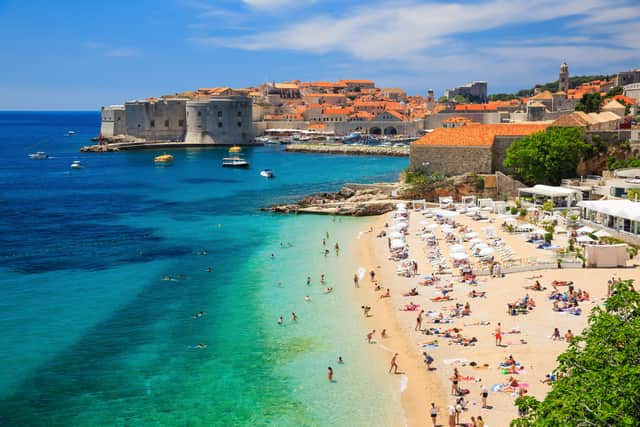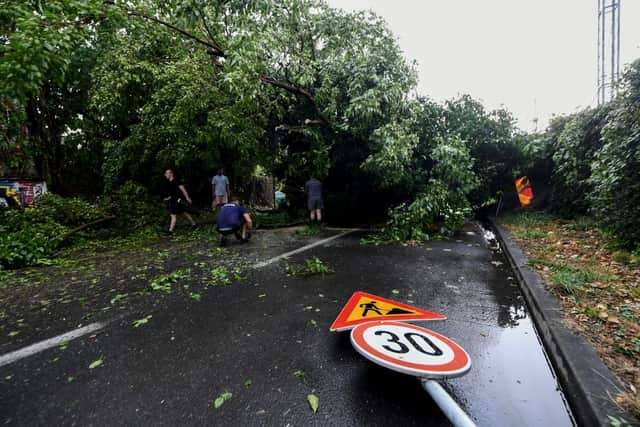Croatia travel warning for holidaymakers as UK Foreign Office updates advice
and live on Freeview channel 276
A travel warning has been issued by the UK Foreign Office to holidaymakers with plans to travel to Croatia.
An alert is currently in place due to extreme weather conditions in the country, with storms earlier this week causing trees to topple, roofs to blow off buildings and tens of thousands of people left without power.
Advertisement
Hide AdAdvertisement
Hide AdThe powerful storms came following a string of extremely hot days due to a heatwave sweeping across Europe, with many popular holiday destinations seeing temperatures in the high 30s and early 40s.


The unsettled conditions caused major disruption in Croatia, Slovenia, Serbia and Bosnia, resulting in emergency services working on Thursday (20 July) to restore electricity and clear the debris left over after Wednesday’s chaos.
Throughout the Balkan region, authorities reported hundreds of people injured, including around 20 seriously hurt from fallen trees, roof parts or other objects blown off by the swirling winds.
A Croatian firefighter tragically died in the eastern town of Tovarnik during the deadly storm that swept the country following the heatwave, bringing the death toll from the storms to six. Three people died on Wednesday in Croatia, one in Slovenia and one in Bosnia.


Advertisement
Hide AdAdvertisement
Hide AdCroatian Prime Minister Andrej Plenkovic said: “Four dead people from a storm like this is a terrible, huge tragedy. There are not too many ways to counter this type of storm. It comes swiftly, it is powerful and it then moves on.”
Mr Plenkovic added that Croatia will establish a warning system for natural disasters and other dangers such as Wednesday’s storm.
Authorities have warned that more storms are possible in the next few days before the next wave of very hot weather begins. In an update to holidaymakers with plans to travel to Croatia, the UK Foreign Office said: “All parts of Croatia can experience extreme storms, including strong winds and rain, lightning, and powerful and large hailstorms.
“Such storms can occur suddenly during summer, particularly at times of extreme heat across Europe. Seek shelter and follow local advice until the storm passes. Check the current weather forecast and warnings at MeteoAlarm.”
Advertisement
Hide AdAdvertisement
Hide AdWarnings for thunderstorms and wind are currently in place across parts of Croatia, with MeteoAlarm warning more than 3mm of rainfall is likely and there is a 90% risk of lightning.
The weather service said: “Take precautions to protect yourself and follow advice provided by relevant authorities. Strong widespread storms are likely, with life-threatening lightning, hail, flash floods and storm gusts.
“Traffic interruptions and power outages are expected. Major interruptions are possible in regular traffic routes. Avoid travel if not extremely important.”
Holidaymakers should also note that passports must be issued less than 10 years before the date you enter Croatia, and be valid for at least three months after the day you plan to leave. If your passport was issued before 1 October 2018, extra months may have been added to its expiry date.
Advertisement
Hide AdAdvertisement
Hide AdAs of 1 January 2023 Croatia is part of the Schengen area, meaning UK visitors can travel to the country for up to 90 days in any 180-day period without a visa. Anyone travelling to Croatia and other Schengen countries without a visa should ensure their whole visit is within the 90-day limit. Visits to Schengen countries within the previous 180 days before you travel count towards your 90 days.
Comment Guidelines
National World encourages reader discussion on our stories. User feedback, insights and back-and-forth exchanges add a rich layer of context to reporting. Please review our Community Guidelines before commenting.
